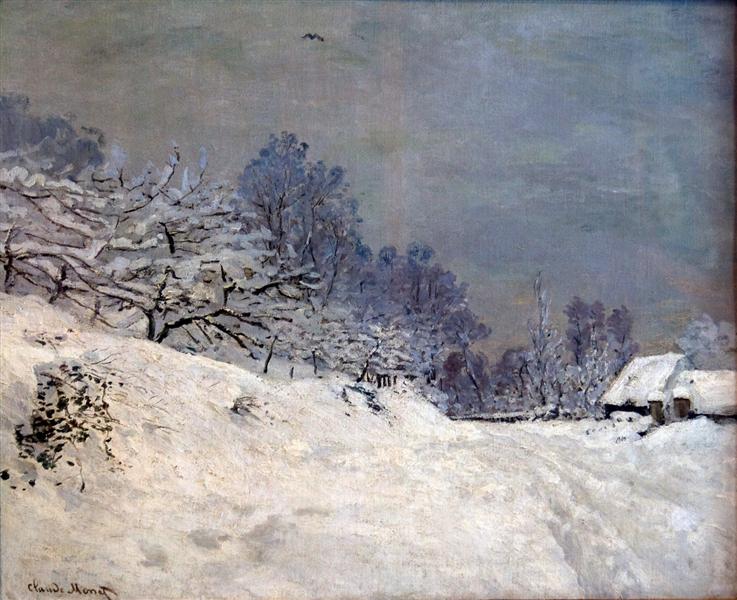Description
Claude Monet's painting "The Road in Front of Saint-Simeon Farm in Winter", painted in 1867, is a work that encapsulates the spirit of plein-air painting that characterized the Impressionist movement, of which Monet is one of the greatest representatives. This work, which belongs to a series of landscapes that the artist made at the Saint-Simeon farm, reflects not only his technical mastery, but also his deep connection with the environment that surrounded him.
In this composition, Monet presents a path that unfolds in the foreground, guiding the viewer's gaze towards a winter landscape. The chosen colour palette is a testament to the cold atmosphere of the scene: soft shades of grey, blue and white predominate, evoking a sense of calm and stillness typical of the winter season. On the horizon, shadows of bare trees and a farmhouse that looms timidly can be perceived, elements that contribute to the almost nostalgic aura of the work. The representation of the sky, with its subtle gradations that, although predominantly grey, also allow glimpses of light, reflects Monet's ability to capture changing natural light conditions, a fundamental aspect of his style.
Compositionally, Monet uses paths and vanishing lines that capture the viewer's attention and invite them to explore the depth of the landscape. The way the path meanders not only organizes the work into a dynamic space but also establishes a sense of movement, suggesting the idea of transit and daily life, a significant aspect of Monet's work, influenced by his interest in modernity and the depiction of contemporary life.
Although there are no clearly defined human figures in the painting, the presence of people can be sensed through the footprints they leave in the snow, hinting at the everyday activity that occurs in the rural setting. This subtlety is characteristic of the Impressionist approach, where elements of modern life are introduced in a subtle and almost evocative way, allowing for a dialogue with the viewer who seeks to fill the void with their imagination.
The work is representative of Monet's quest to capture the essence of a moment, using techniques such as rapid brushwork and his particular attention to light. This is especially evident in how the colors play off each other, creating a visual vibrancy that allows the viewer to almost feel the freshness of the winter air. Monet moves away from detailed, precise depiction to allow the emotion and impression of the scene to predominate over strict figurative elements.
An interesting aspect of this work is its relationship to time and weather, which were recurring themes in Monet's work. Through the depiction of different seasons and atmospheric conditions, Monet managed to develop a visual language that speaks of the transience and fleeting beauty of nature, themes that would resonate throughout his career.
In short, "The Road in Front of Saint-Simeon Farm in Winter" is a work that not only displays Claude Monet's technical skill, but is also a testament to his artistic philosophy. Through his palette, his composition, and his way of insinuating life through nature, Monet invites the viewer to experience a particular moment in a space that breathes enigma and reverie. This canvas, with its apparent banality, is transformed into a profound reflection on life, landscape, and light, elements that define the legacy of Impressionism and its master.
KUADROS ©, a famous painting on your wall.
Hand-made oil painting reproductions, with the quality of professional artists and the distinctive seal of KUADROS ©.
Painting reproduction service with satisfaction guarantee. If you are not completely satisfied with the replica of your painting, we will refund 100% of your money.

